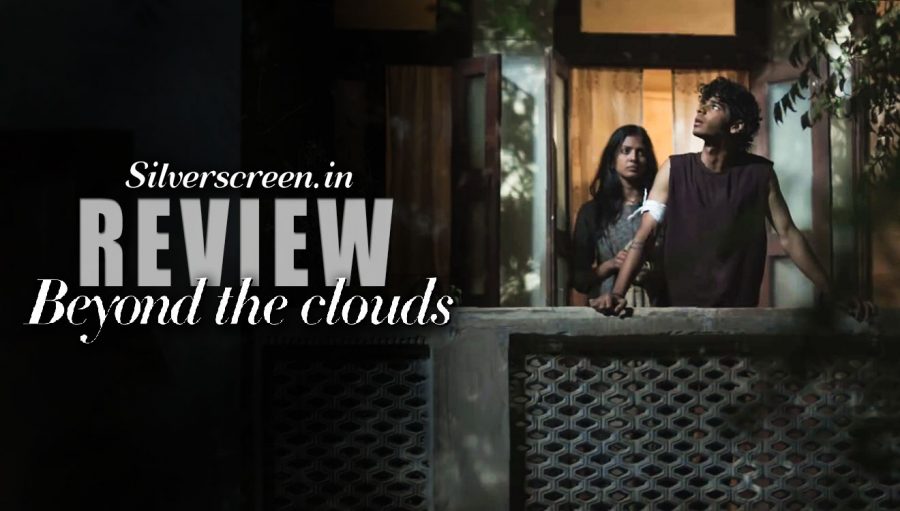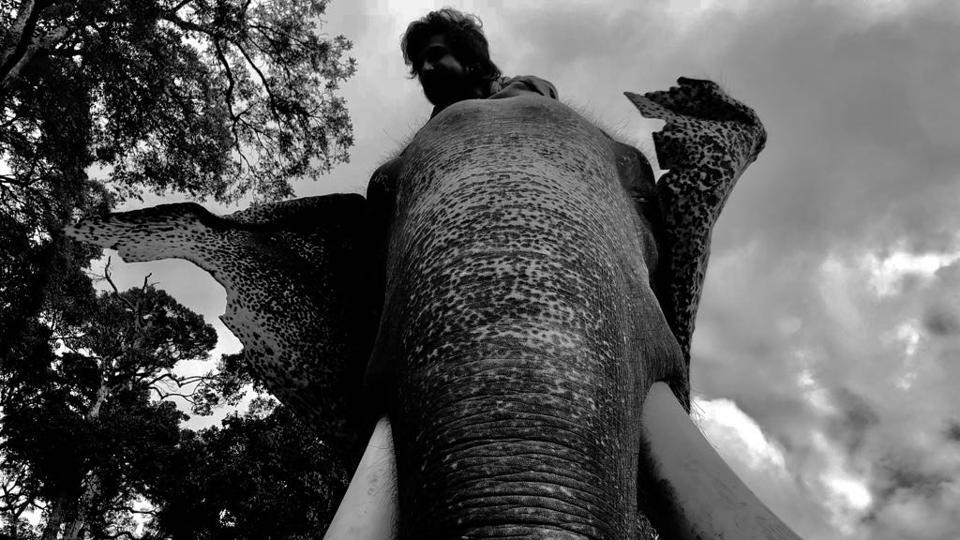Majid Majidi’s Beyond The Clouds opens to the visual of a new Mumbai – the sparkling city roads by the side of which a giant billboard screams, “Join The Jio Movement”. Then the camera pans down, below the over-bridge, to the gutters where the corporate companies are least interested in. Majidi sets his humanitarian tale here, in this underbelly of Mumbai which was previously featured in films such as Salaam Bombay, Slumdog Millionaire and several Bollywood noir dramas in the last decade. The visuals are neither as crude as they are in Danny Boyle’s Oscar winning movie, nor bright-colored as in Wake Up Sid, which was also shot by the film’s DoP Anil Mehta. Majidi’s Mumbai looks carefully set up by an art director, like those sparrows in Tara’s (Malavika Mohanan) house and the tan on Aamir’s (Ishaan Khattar) face.
The siblings, Aamir and Tara, meet after several years of separation when he runs into the dhobi ghat (public laundry), where she works, while running from the cops. He, in his late teens, is a drug peddler, and she, a few years elder to him, survives on odd lowly jobs. In a bid to rescue him from the cops, she and her co-worker, Akshi (Goutam Ghose) hide him beneath a pile of clothes. The next day, he asks her to retrieve a packet of drugs he had passed on to Akshi during the chase. What follows is a rape attempt that results in her landing a fatal blow on Akshi’s head that leaves him in a vegetative state, and she is duly sent to prison for attempted murder.
The maker of the inimitable Children Of Heaven and Song Of Sparrows gets a lot of things right in his Indian debut, especially those that are universal, like the delicate spirit of children who manage to find reasons to laugh and revel even in the most unlikely places. To get Tara out of prison, Aamir has to nurse Akshi back to life, and in the process, he becomes a guardian to the man’s indigent Tamil family that consists of a grandmother (an excellent GV Sharada) and two little daughters. Tara becomes a foster parent to a fellow inmate’s (Tannishta Chatterjee) young son. The scenes involving children are the film’s forte. In spite of all those feigned sugary taste that they elicit, those scenes are where Majidi talks about what perhaps is closest to his heart – compassion that makes the world a better place.
Also, Beyond The Clouds gives the eminent Anil Mehta a coveted opportunity that Bollywood has often refused him – to let his camera be a brilliant co-participant in the narration. The visuals are subtly eloquent. Arguably, one of the best part of the film is the chase sequence that comes in the initial half. Aamir and his friend run through narrow alleys, crowded streets, and markets to the dhobi ghat, to escape from the police. Mehta and Majidi construct a visual that draws attention to the bustling life of the city, rather than cynically lamenting the filth and poverty. Another impressive part is the relationship arc of Aamir and Tanisha, Akshi’s eldest daughter. The stormy night the family takes shelter in Aamir’s house, he watches the silhouette of the child from behind a makeshift curtain as she unties her hair and braids it before going to bed. Like him, we too start noticing her resemblance to Tara. One could write pages of scenes and dialogues to say this, but in Beyond The Clouds, it is sublimely cinematic.
And AR Rahman’s music ably helps build an ambience of optimism that underlines the film. When little Asha, Tanisha’s sister cries one night, Aamir plays the famous Mukkabala song to make her smile. Of course, who better than Rahman to bridge the steep, complicated gap between the north and the south of India!
Recommended
But several things are unpalatable in the auteur’s first Indian outing. To begin with, the lack of authenticity in the emotions he tries to conjure up, especially in the initial sequences that establish the bond between the protagonists – the siblings, Aamir (Ishan Khatter) and Tara (Malavika Mohanan), who grew up together in a slum, and get caught in the miserable situation. The dialogues (written by Vishal Bhardwaj) barely cast an impression, and the actors’ weak performances make it worse. Aamir’s overwhelming adolescent energy and optimism start falling apart when he witnesses his sister’s life from closer quarters. We sense his energy slowly draining out. While this part of the film is convincing enough, Tara’s part of the story is sketchy. The woman who could single-handedly bring up a younger sibling in Mumbai, fighting all odds, appear dreary and lifeless inside the prison, sans a will to live, although she is let known that the case isn’t strong enough to keep her inside the prison forever. Khatter and Malavika don’t look at ease in the film’s milieu, and struggle to mask the elite background they come from. While Khatter invokes his inner Bollywood star, oozing a swag that belongs more to Rangeela than here, Malavika reduces Tara’s inner turmoil to hysterics.
Beyond The Clouds pales in comparison with Majidi’s Iranian dramas, mostly because of a serious lack of genuineness in the proceedings. Beneath the sheet of what appears to be Majidi’s sophomoric fascination for Mumbai’s multiculturalism and multitude, bad acting, and a screenplay that appear overtly simplistic, lies a compelling tale of innocence and kindness that isn’t bound by geography or time. In some fantastic moments, it comes out and reveals itself.
***
The Beyond The Clouds review is a Silverscreen original article. It was not paid for or commissioned by anyone associated with the movie. Silverscreen.in and its writers do not have any commercial relationship with movies that are reviewed on the site.



